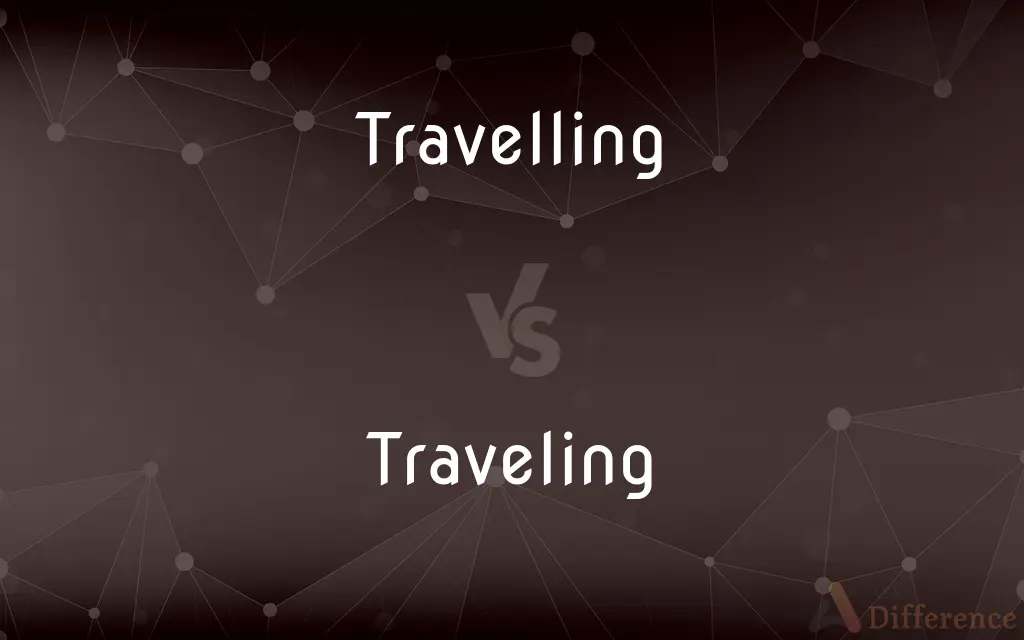Travelling vs. Traveling — What's the Difference?
By Urooj Arif & Maham Liaqat — Updated on March 11, 2024
"Travelling" with double "l" is the preferred spelling in British English, while "traveling" with one "l" is used in American English.

Difference Between Travelling and Traveling
Table of Contents
ADVERTISEMENT
Key Differences
Both "travelling" and "traveling" refer to the act of moving from one place to another, which can be for various reasons such as exploration, leisure, business, or commuting. The difference in spelling reflects the variation in British and American English usage, not a difference in meaning or context.
In British English, it's common to double the final consonant before adding a suffix if the last syllable of the word is stressed, hence "travelling." American English, however, typically does not double the consonant in this case, resulting in "traveling."
This pattern of variation applies to other words in British and American English. For example, "cancelled" and "canceled," "labelled" and "labeled," showing the consistency in spelling conventions between the two variations of English.
Despite the spelling differences, the pronunciation of "travelling" and "traveling" is the same in both British and American English, and they are understood universally, regardless of the spelling used.
The choice between "travelling" and "traveling" depends on the intended audience or the standard spelling conventions of the English variant being used. Writers should consider consistency in their use of British or American spellings, especially in formal writing.
ADVERTISEMENT
Comparison Chart
Spelling
Double "l"
Single "l"
Usage
Preferred in British English
Preferred in American English
Context
Same as traveling
Same as travelling
Pronunciation
Identical to traveling
Identical to travelling
Spelling Rule
Double the consonant before a suffix if the last syllable is stressed
Typically does not double the consonant
Compare with Definitions
Travelling
Moving from one place to another.
She loves travelling around Europe.
Traveling
Associated with adventure and exploration.
She documented her traveling experiences in a blog.
Travelling
Often involves exploring new places.
His job involves travelling to different cities.
Traveling
Act of going from one location to another.
He's traveling to Japan next month.
Travelling
Can refer to various modes of travel.
Travelling by train can be very scenic.
Traveling
Includes all forms of transportation.
Traveling by plane is fastest for long distances.
Travelling
Can be used for leisure or business.
Their family enjoys travelling during the holidays.
Traveling
Purposes vary from pleasure to work.
They're traveling for a business conference in New York.
Travelling
'history of traveling'
Traveling
To go from one place to another, as on a trip; journey.
Travelling
To go from one place to another, as on a trip; journey.
Traveling
To go from place to place as a salesperson or agent.
Travelling
To go from place to place as a salesperson or agent.
Traveling
To be transmitted, as light or sound
The speed at which sound travels through water.
Travelling
To be transmitted, as light or sound
The speed at which sound travels through water.
Traveling
To move along a course, as a phonograph needle in the groove of a record.
Travelling
To move along a course, as a phonograph needle in the groove of a record.
Traveling
(Informal) To move swiftly
This car can really travel.
Travelling
(Informal) To move swiftly
This car can really travel.
Traveling
To go about in the company of a particular group; associate
Travels in wealthy circles.
Travelling
To go about in the company of a particular group; associate
Travels in wealthy circles.
Traveling
To admit of being transported without loss of quality; Some wines travel poorly.
Travelling
To admit of being transported without loss of quality; Some wines travel poorly.
Traveling
(Basketball) To move illegally while holding the ball, usually by taking more than two steps between dribbles or by moving a foot that has been established as a pivot.
Travelling
(Basketball) To move illegally while holding the ball, usually by taking more than two steps between dribbles or by moving a foot that has been established as a pivot.
Traveling
To pass or journey over or through; traverse
Travel the roads of Europe.
Travelling
To pass or journey over or through; traverse
Travel the roads of Europe.
Traveling
The act or process of traveling from one place to another
With the railroad, travel between cities became swift.
Travelling
The act or process of traveling from one place to another
With the railroad, travel between cities became swift.
Traveling
A series of journeys
Her travels in Africa.
Travelling
A series of journeys
Her travels in Africa.
Traveling
An account of one's journeys.
Travelling
An account of one's journeys.
Traveling
The activity or business of arranging trips or providing services for travelers
She works in travel.
Travelling
The activity or business of arranging trips or providing services for travelers
She works in travel.
Traveling
Movement or passage
The travel of the planets around the sun.
Travelling
Movement or passage
The travel of the planets around the sun.
Traveling
The motion of a piece of machinery, especially of a reciprocating part; stroke.
Travelling
The motion of a piece of machinery, especially of a reciprocating part; stroke.
Traveling
The length of a mechanical stroke.
Travelling
The length of a mechanical stroke.
Traveling
Present participle of travel
Travelling
Present participle of travel
Traveling
(basketball) A violation committed by progressing while holding the ball instead of dribbling it.
Travelling
The act of one who travels; a journey.
Traveling
The action of the verb travel.
Travelling
That travels (with one)
A travelling companion
Traveling
That travels (with one).
A traveling companion
Travelling
The act of going from one place to another;
He enjoyed selling but he hated the travel
Traveling
The act of going from one place to another;
He enjoyed selling but he hated the travel
Traveling
Working for a short time in different places;
Itinerant laborers
A road show
Traveling salesman
Touring company
Common Curiosities
Are there any exceptions to the doubling rule in British English?
Yes, if the last syllable is not stressed, the consonant is not doubled in British English, as in "benefited" or "targeted."
Can both spellings be used interchangeably?
While both are understood, it's best to stick to one spelling convention (British or American English) in a given piece of writing for consistency.
Is one spelling considered more correct than the other?
Neither spelling is "more correct"; it depends on the linguistic context (British vs. American English) in which it is used.
Do other English-speaking countries follow the British or American spelling?
Other English-speaking countries may lean towards British English (e.g., Australia, Canada) or American English (e.g., Philippines) spellings, often with some variations of their own.
Does the spelling difference affect verb conjugations?
Yes, the spelling difference extends to verb conjugations like "travelled/traveled" and "travelling/traveling."
Is the meaning of "travelling" and "traveling" different?
No, the meaning is the same; the difference is purely in spelling based on British or American English conventions.
How do you decide which spelling to use?
The choice depends on your audience or the standard conventions of the English variant you are using or are most comfortable with.
How is the past tense of "travel" spelled in British and American English?
In British English, it's "travelled," and in American English, it's "traveled," following the same convention as "travelling/traveling."
Can software detect the difference between British and American spellings?
Yes, most spell-check software can be set to either British or American English standards and will flag the variant that doesn't match the chosen setting.
How can learners of English remember the spelling difference?
Remembering the broader differences in spelling conventions between British and American English can help, with British English often doubling final consonants and American English typically not.
Share Your Discovery

Previous Comparison
Slow vs. Tardy
Next Comparison
Deceit vs. TrickeryAuthor Spotlight
Written by
Urooj ArifUrooj is a skilled content writer at Ask Difference, known for her exceptional ability to simplify complex topics into engaging and informative content. With a passion for research and a flair for clear, concise writing, she consistently delivers articles that resonate with our diverse audience.
Co-written by
Maham Liaqat














































